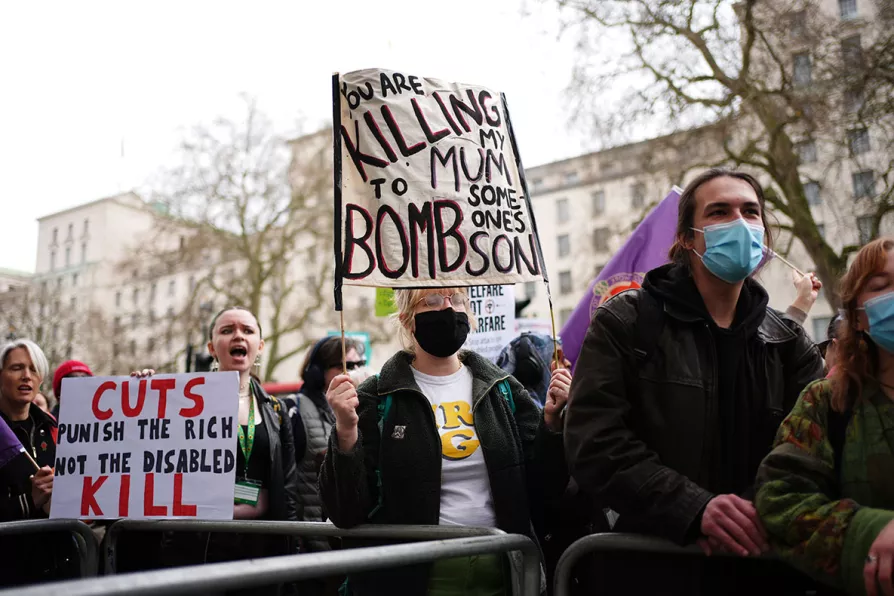World Health Organisation warns that 'current rates of improvement are insufficient'

 Protesters on Whitehall in London, as Chancellor of the Exchequer Rachel Reeves delivers her spring statement to MPs in the House of Commons, London, March 26, 2025
Protesters on Whitehall in London, as Chancellor of the Exchequer Rachel Reeves delivers her spring statement to MPs in the House of Commons, London, March 26, 2025
INEQUALITY continues to kill people on a “grand scale” across England and the world, experts have warned, with poor housing and a lack of education and jobs affecting their health.
A new report from the World Health Organisation (WHO) revealed today that targets designed to help tackle global health inequalities within a generation will not be met.
The warning comes 16 years after WHO’s 2008 commission on the social determinants of health laid out a roadmap to reduce health gaps caused by socioeconomic inequalities.
The commission warned that where and how people are born, live, work and age — and their access to power, money and resources — greatly influence their health outcomes.
One major target was to halve the gap in life expectancy between countries and within nations by 2040.
While progress has been made, WHO said that “current rates of improvement are insufficient” to meet these goals in the next 15 years.
According to the report, improvements in public infrastructure and social conditions have been “brought to a halt by a series of predictable and preventable global crises,” including armed conflict and pandemics.
UCL Institute of Health Equity director and commission chairman Professor Sir Michael Marmot said action on health required the whole of government, not only of health departments.
He said that too few countries have taken advantage of the technical advice from 2008, adding: “As such, the targets we set to close the health gap in a generation will be missed.
“It is a sad indictment on government leaders that social injustice continues to kill on such a grand scale.”
The gap in life expectancy between the most and least advantaged groups within some countries has widened in the last two decades.
According to the researchers, since 2008, a million people in 90 per cent of areas in England were living shorter lives than they should have been between 2011 and the start of the Covid-19 pandemic.
National life expectancy also stalled between 2010-12 and 2020-22, with the steepest drops seen in the most deprived 10 per cent of neighbourhoods in north-east England.
End Fuel Poverty Coalition co-ordinator Simon Francis said inequality “embedded into British society” means the youngest children, pensioners and the lowest-income households are hit hardest.
He said: “Millions live in cold, damp homes due to energy prices kept sky high by our reliance on gas. This means people racking up debts, risking their health and falling further behind.
“Children in particular are facing worsening respiratory illness, undernutrition and poor mental health due to unsafe housing.”
Mr Francis said that Britain’s poorly insulated homes waste a quarter of heating spend due to poor energy efficiency, adding to costs and deepening hardship.
“Despite government promises, real change needs urgent investment, but according to media reports, the Chancellor is unwilling to make the money available for the £13.2 billion Warm Homes Plan,” he said.
“This was a Labour manifesto commitment and Rachel Reeves must see it through. Without action, housing inequality will keep driving poverty and poor health for generations.”
Prime Minister Sir Keir Starmer pledged before the general election to invest in improving energy efficiency and insulating millions of British homes under the Warm Homes Plan.
But Whitehall officials said today that ministers are considering scaling back the plan as part of a wider review of departmental spending due in early June.
Keep Our NHS Public co-chairman Dr John Puntis said addressing the social determinants of health must be an “absolute priority” for the Labour government.
“This must include a redistribution of wealth from rich to poor,” he said.
“Health service policies that in practice favour the better off, such as outsourcing care to the private sector, must also be revised.”
WHO called for action to address the “structural drivers” of inequality, including economic and political systems that create an unequal distribution of money, power and resources.
“The new report reinforces that most health outcomes are driven by the social circumstances of daily life, and inequities in power, money and resources,” Prof Marmot said.
“These structural drivers of health inequalities have received much less focus over the period since they were laid out in the commission’s report.”














